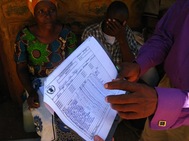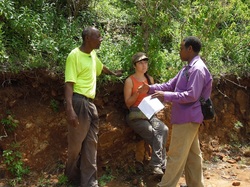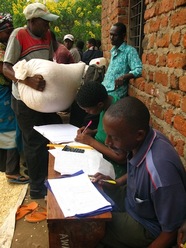
 Inquiring data on water issues in Mhero
Inquiring data on water issues in Mhero While it should be comparatively easy to count the people of a sub-village, we have experienced that it is even much more challenging to determine the yield of the harvest. We are dealing with villages where the huge majority consists of smallholder farmers and basically everyone is involved in some farming activities. In order to improve the life of these farmers, it would be really important to know the yield of each year, differentiating between domestic consumption and what is sold on the local market or elsewhere. In addition it would also be important to know why it might have been a particularly good yield in a certain year (e.g. enough rain, the introduction of an improved crop variety, the use of fertilizers or a training workshop on improved farming). Doing an external intervention is indeed a hard thing to do when the data is not available and it’s necessary to rely on rather random stories from farmers, which might give a glimpse of the overall picture, but does not necessarily tell the whole story.
 Food distribution committee
Food distribution committee Statistics and data are providing important information to make informed decisions. This is true not only for the people from the outside who want to understand the community, but very much so for the community itself. Having statistics available with the necessary explanations why a certain harvest has been particularly good or bad will help to understand what works and what doesn’t. Otherwise, it is just a best guess what is useful. Knowing what to do is tough if not impossible.
The challenge to keep statistics is very much linked to education and KIHO wants to start at the school level. It will be necessary to train teachers as models for their students in how to keep statistics. However, also current local community initiatives are in high need of training. For KIHO, it will be one of the main activities to get out to the villages, particularly to community initiatives, and raise awareness on keeping statistics and provide the necessary training that will allow for taking more informed decisions in the future.
 RSS Feed
RSS Feed
